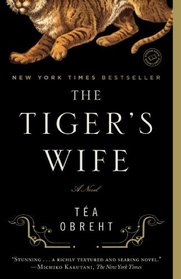Helpful Score: 11
When I finished The Tiger's Wife by Tia Obrecht, I realized that the read was not the one I expected. It's a gentle read about memories, death, and the future. Natalia loves her grandfather dearly. He taught her so much about life and people that when he dies she begins to recall the many incidents that marked his life and hers. She was the only one he told he was so ill. He was her mentor so she, too, became a doctor. One of the stories that is so memorable for the reader are those of the tiger's wife, a deaf-mute woman whose very existence evokes superstition among the village people. The other is that of the mora or deathless man whose encounter highlight her grandfather's life and whom, she, too, gets to meet. The tiger is a thread that winds throughout the book because of her grandfather's love of tigers. If you expected an adventure tale skip this one but if you want one to read, muse about life and death and the tales therein this is a read for yo
Helpful Score: 10
I looked forward to this book after seeing it on the NYT bestseller list for so long. I was disappointed, and felt the book was boring. I had a hard time getting into it, but kept reading until halfway through, and gave up. There is mostly narrative, little dialogue and a story line that I thought hard to follow at times. I also felt the plot and characters were not believable. It is very rare that I leave a book unfinished, even if it is not exactly one I like. But this one was a "tough go" for me, and I sent up the white flag at the halfway mark. It is a mystery to me how it got to the bestseller status, and even more, has stayed there so long.
Helpful Score: 5
While I tried very hard to see the 'stunning, richly textured and searing novel' the cover said it would be, like a lot of others...it just didn't do anything for me. I began to wonder how someone could possibly describe it as stunning and searing. It plods along and manages to confuse you the entire way.
Helpful Score: 4
The book is very well written (which I always love) but the story is like a strung together, and somewhat misjointed, series of village myths. I had a hard time relating to any character or any story line.
Helpful Score: 3
My favorite parts of this novel were the fantastical stories at its core: The Tiger's Wife and The Deathless Man. These stories were told to Natalia, a young doctor in an unnamed Balkan country, by her grandfather. Wrapped around these two stories was Natalia's own story: that of a generation warped by war, of her journey to becoming a doctor like her grandfather, of her mission to inoculate orphans in a neighboring country, and the loss of her grandfather while on this trip.
Although Natalia is the narrator, and I'm sure this part of the story is closest to Obreht's own experiences, I just didn't connect with her story as much as I did the more distanced tales. The stories pieced together from what her grandfather told her and what she was able to glean from the remaining inhabitants of his childhood village were fascinating. I would have been happy to read an entire novel just consisting of those stories (which would have been a 4 or 5 star novel for me), but that's not the bigger story Obreht wanted to tell. I like what she's trying to do -- the layering, the interconnectedness of the stories -- but it didn't quite work for me.
I found it really difficult to keep track of all the characters in the various stories, so when some of the stories began to overlap, it took me a while to figure out the connections. (Or maybe I'm just slow.)
Although Natalia is the narrator, and I'm sure this part of the story is closest to Obreht's own experiences, I just didn't connect with her story as much as I did the more distanced tales. The stories pieced together from what her grandfather told her and what she was able to glean from the remaining inhabitants of his childhood village were fascinating. I would have been happy to read an entire novel just consisting of those stories (which would have been a 4 or 5 star novel for me), but that's not the bigger story Obreht wanted to tell. I like what she's trying to do -- the layering, the interconnectedness of the stories -- but it didn't quite work for me.
I found it really difficult to keep track of all the characters in the various stories, so when some of the stories began to overlap, it took me a while to figure out the connections. (Or maybe I'm just slow.)





![header=[] body=[Get a free book credit right now by joining the club and listing 5 books you have and are willing to share with other members!] Help icon](/images/question.gif?v=52444873)
